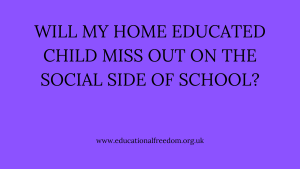
Socialisation has two meanings. The first is to mix socially with others and the second is learning to adapt to integrate into society.
As such the idea that children “socialise” in school and need to be around children of the same age for most of their lives is a rather recent western idea. It is not based on scientific fact nor does it fit a one size fits all system. Within a classroom, children are forced to socialise with 30 other children of similar age and demographic. Playtime within the schools is very limited, not just in time but in age groups. There is also very often little ‘equipment’ to choose from and use.
Home education children for the most part have an extremely high standard of social experiences and abilities. Why? Because they get to mix with people of all ages and all backgrounds. From the toddler next door, to the elderly people down the road. From the nice people at the shops, local children and of course home educators of all ages and abilities – they socialise with them.
Then they have longer and more real opportunities to work on conflict, social skills and the chances to build real last friendships. Yes, there are some children who may go a few days, a week or more without seeing other children, but that time when they do is quality time. Home educated children as well get the chance to do what adults do when they socialise.
They get to choose who they socialise with. They choose when they socialise with them. And where they want to socialise from! Whether it is in parks, or cafes to sports. The parent or carer of the child might have to organise more play dates. Yes! But that time they do socialise, well its more natural, more skilled and healthier.
Children who are introverts have more space and time, they can choose to be with fewer people or in an environment where they can learn and process socialisation in a way that’s optimum for that individual. If you were forced when unhappy to socialise this would not be classed as good socialisation and the same applies for children. Forcing children to socialise has no proof that it helps them “come out of themselves” and studies show the opposite. These children withdraw and become overwhelmed.
Just as with education there is no set rule. Each child is individual whether an introvert, extrovert or a happy go lucky child. To one child’s “quiet week” is another’s “far too busy” week. Regardless, the social time for each individual is authentic, allows skill and social development and is more natural and in line with how adults socialise.
There are a huge amount of home ed meetings and outings, there are holidays and festivals. On top of this there are “after school” clubs that your child can join the same as the children at school. From Dance classes, gym classes, St John’s Ambulance, Young Farmers, sports classes……well the list is endless!
There are a few ways to find local families: there is likely to be a Facebook group for your LA area/county, there may also be one on Yahoo Groups. Please have a look at our social map to see if there’s a known group near you. If one isn’t listed, don’t despair – there probably is one, just have a look on Facebook or ask in a national group.
Make sure to find us on social media.
Staffordshire website design and website SEO by Fellowship Studios.